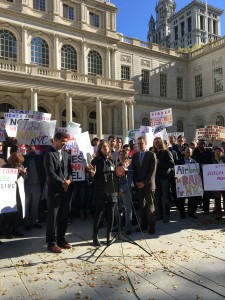
From Left to Right: Council member Ydanis Rodriguez, Council member Helen Rosenthal, State Assembly member Deborah Glick, and Council member Mark Levine speak at the rally against illegal hotels. Image credit: CityLand
The proposed laws seek to enforce existing State regulations by increasing illegal hotel fines and reporting requirements. On October 30, 2015, the City Council Committee on Housing and Buildings heard testimony on three proposed laws that seek to ramp up enforcement of state laws that prohibit the operation of illegal hotels. The proposed legislation would regulate only those residential units located in multiple-dwelling buildings—not one- to four-family homes. The proposed legislation is intended to address property owners who repeatedly and illegally rent out entire apartments, particularly rent-regulated apartments, for less than thirty days.
Intro 826, sponsored by Council member Helen Rosenthal, would substantially increase the civil penalty amount that must be issued by the Department of Buildings for the conversion of permanent residential housing units into illegal hotels. Intro 823, sponsored by Council member Ydanis Rodriguez, would require Buildings to submit to the Council an annual report on citywide illegal-hotel operations, including the number of violations issued, the recipients of such violations, and the pecuniary amounts fined. Intro 788, sponsored by Council member Mark Levine, would require that tenants receive notification in the information guide—the ABC’s of Housing—of their existing right to withhold rent if the property owner violates the building’s certificate of occupancy.
At the hearing, Council members Rosenthal, Rodriguez, and Levine each spoke about their proposed legislation. Ms. Rosenthal spoke first about Intro 826, which would require Buildings to fine illegal hotel operators at least $10,000, but not more than $50,000, with an additional maximum penalty of $2,000 per day thereafter that the violation is not corrected. Ms. Rosenthal testified that she is open to administering warnings, rather than civil penalties, to first-time offenders. “People certainly need to learn what the law is,” said Ms. Rosenthal, “particularly when we have corporations not being honest and saying the law is something it isn’t.”
Mr. Rodriguez testified that illegal hotels are the largest obstacle facing the City in its efforts to create affordable housing. As the representative of the community board with the largest amount of rent-regulated apartments in the City, Mr. Rodriguez explained that he is aware of the dishonorable ways in which landlords have been systematically uprooting their tenants to use their apartments as more profitable, temporary rentals. “By enhancing the penalties issued to illegal operators, we have the opportunity to make these fines more than the cost of doing business and serve as a deterrent to operators,” said Mr. Rodriguez.
Mr. Levine testified that the focus of his proposed law is to address building owners and landlords who choose to turn their dwelling units into “de facto hotels.” Mr. Levine explained that these landlords and building owners are choosing to do this for one reason: “They can make more money, and often they can skirt existing rent regulation laws in the process.” He testified that in most cases, these landlords and building owners are violating their buildings’ certificates of occupancy, because a certificate that provides for a building’s use as residential is violated if any of the units within the building are converted into temporary rentals. Under existing City legislation, this violation is grounds for such tenants to withhold rent, and Intro 788 would ensure that tenants are informed of their right to do so.
A rally was held in support of the proposed legislation on the steps of City Hall moments before the October 30th meeting began. The rally was attended largely by members of the Share Better coalition, elected City officials, and many tenant and housing advocates. Several public officials spoke at the rally, including Ms. Rosenthal, Mr. Rodriguez, Mr. Levine, and State Assembly member Deborah Glick. Tom Cayler, chairman of the Illegal Hotel Committee for Manhattan’s West Side Neighborhood Alliance, also spoke at the rally. All speakers conveyed a uniform message against Airbnb’s illegal and deceptive practices in the City.
City Council Int. 0826-2015; 0823-2015; 0788-2015 (Oct. 30, 2015).
By: Jessica Soultanian-Braunstein (Jessica is the CityLaw Fellow and a New York Law School Graduate, Class of 2015)

